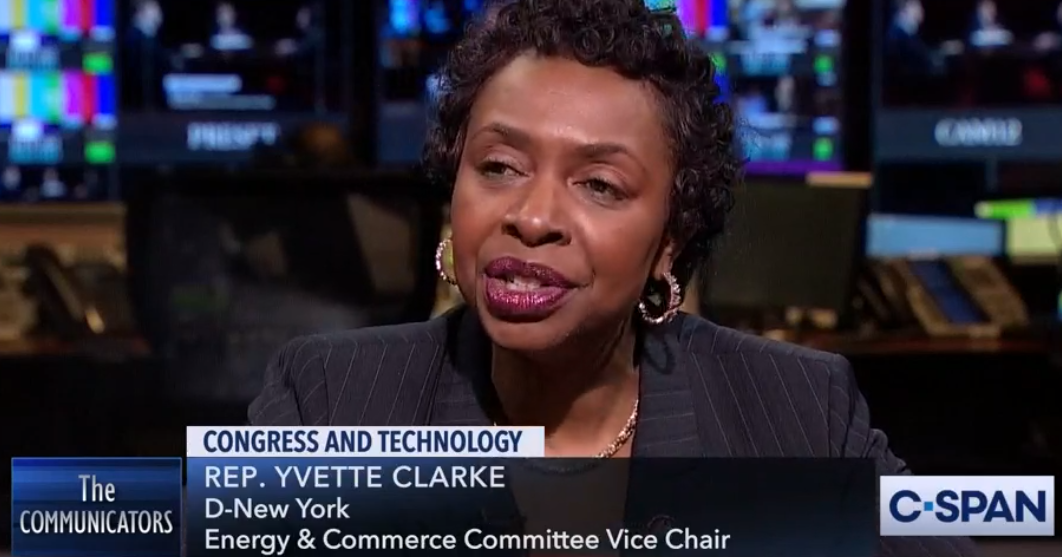Rep. Clarke: Algorithms Are Baking Discrimination Into Big Tech

The smarter way to stay on top of the multichannel video marketplace. Sign up below.
You are now subscribed
Your newsletter sign-up was successful
Social media company dominance has translated into a "certain level of arrogance and abuse" that is not "in the best interests of the American people."
That was the word from House Energy & Commerce Committee vice chair Rep. Yvette Clarke (D-N.Y.) in an interview for C-SPAN's Communicators series.
Clarke echoed criticisms by a number of groups that many Silicon Valley companies don't reflect the diversity of the country. She said the lack of that perspective winds up baking discrimination into the system via algorithms "that is going to be very hard to unpack."
Related: Sen. Whitehouse Slams Social Media
She said that as Big Tech builds out the infrastructure for a connected world. Congress needs to be having "some level of discourse so that we understand what the implications are of what is being built and how it is being deployed." That includes getting advisers who can talk the tech lingo. Clarke is co-chair of the Smart Cities Caucus, so is focused on broadband deployment and connectivity as well as what Big Tech does with data and privacy once all that broadband is connected.
Clarke said she did not think the Trump Administration was doing enough to keep Chinese telecom Huawei and other "nefarious characters" out of 5G networks, though she said there was a way to do that. She was asked whether she would own a Huawei phone and she quickly said "no," given that China and other nations were looking to "eat our [5G] lunch."
She said she did not want to stigmatize or single out Huawei, pointing out that people also had issues with Amazon and Alexa and technology that "you think is sleeping but it's actually recording. So, there is a lot we have to unpack in terms of technology within our homes and communities and throughout society in a way that privacy of information comes first."
The smarter way to stay on top of the multichannel video marketplace. Sign up below.
Related: House Looks to Lock Up 5G Security
She was asked if Congress is prepared to do that--there is bipartisan support for privacy legislation, but partisan devil is in the details. She said that she thought Congress had the wherewithal to do that, but "are we at that point right now, I don't think so," she said. "I think there is a lot more we must learn and collaborate [on]" before legislation. She said the last thing they wanted to do was stifle innovation.
Clarke touched on a theme that has gotten traction in recent weeks, which was that the debate over Big Tech's role was not just about equipment or software or networks, but about what kind of society results, one where tech is used to censor and control, or to liberate and unite.
"People are aware of the fact that we can't conduct businesses, we can't conduct our lives without interfacing with technology in all of its manifestations. What they are concerned about is how that is managed in a way in which it adheres to American values. That is the challenge that we all face. We keep sort of moving the goalpost on what is an American value."
She said it is important to make it clear to the companies developing new tech what those values are and the expectations are in terms of how we address concerns about how the technology is used."
Clarke's Communicators interview aired over the weekend, but viewers can still catch it Monday night (Nov. 11) at 8 p.m. on C-SPAN2 or online.
Contributing editor John Eggerton has been an editor and/or writer on media regulation, legislation and policy for over four decades, including covering the FCC, FTC, Congress, the major media trade associations, and the federal courts. In addition to Multichannel News and Broadcasting + Cable, his work has appeared in Radio World, TV Technology, TV Fax, This Week in Consumer Electronics, Variety and the Encyclopedia Britannica.

